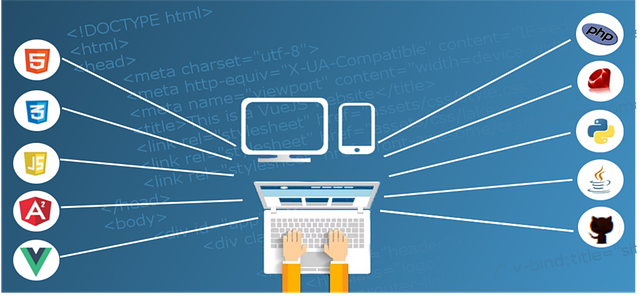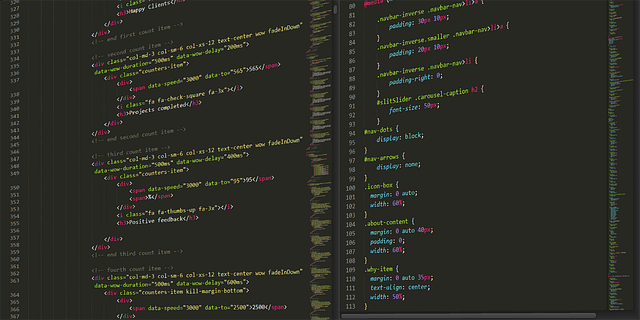Every enterprise owner needs to make sure that their business runs smoothly and ensure digital transformation in their organization. As such, Enterprise Resource Planning, or ERP systems, are becoming more and more prevalent. The effectiveness of such a system will depend on the programming language used to develop it. What programming languages are needed to develop an ERP system, and where can they be obtained? How can a business owner choose the right ones, as well as the best solutions for their business objectives? These are the questions that owners and IT professionals need to understand in order to ensure reliable ERP system development.
The current environment of digital transformation bears many challenges, and ERP systems need to evolve and adapt to new trends. For example, integrating AI and Machine Learning technologies into existing ERP systems to automate processes is becoming more and more widespread. At the same time, ERP solutions are expected to perform transactions with high accuracy and without obstacle. As such, choosing the right programming language for an ERP system has become an important factor for any business owner.
References from authoritative sources, such as the Financial Times, back up the importance of ERP systems for businesses, and the need for strong programming languages. A decision made by the wrong language can likely facilitate different problems such as cost overruns, inconvenience and even safety issues. Thus, it is essential that businesses understand what programming languages are necessary for an ERP system, and where software solutions can be found.
In this article, you will learn about the different programming languages needed to develop an ERP system and, most importantly, how to choose the right ones. Through research and case studies, this article will provide clear advice on the best software options for any business owner, and how to ensure a successful deployment of an ERP system.
Defining Languages for ERP System Development
When developing an Enterprise Resource Planning (ERP) system, there are several programming languages that must be considered. Many of these languages are important for enabling programmers to access data systems, create complex applications, and make communication between applications easier. In this article, we will define the languages needed for creating an effective and efficient ERP system.
SQL (Structured Query Language): this language is used to interact with databases and create structured queries that can be used to retrieve information and organize it in a specific manner. It is also used for updating and expanding databases as administrator instructions require.
HTML: this language is used for designing webpages and creating the user interface for the ERP system. This includes formatting text, adding images, and other elements that appear to the users.
JavaScript: this language is used for adding interactive features to the user interface. It is used to create functions that help to respond to user input, manage calculations, and reduce the amount of data entry the user must make.
C++: this language helps to create and coordinate applications. C++ is a general-purpose language that can be used to create complex applications, including ERP systems. It is used to make solutions more efficient, and for giving users a more dynamic experience.
Python: this language is used for data analysis and creating algorithms. It is a general-purpose language, that is easy to learn and read. This makes it ideal for automating tedious processes, taking large amounts of data and creating useful information.
PHP: this language is used for creating webpages with dynamic elements, such as form processing. It is used to store data, create user accounts, and make communication between webpages more efficient.
These are the primary programming languages used when creating an ERP system. Each of these languages has unique advantages and should be considered when designing an ERP system. With the proper use of these languages, organizations can build an efficient and secure ERP system for their organization.
Overview of ERP System Development
Overview of ERP System Development
When it comes to developing enterprise resource planning (ERP) systems, knowing the right languages is essential for successful development. These programming languages are used to customize an ERP system to the individual needs of a client. Each language performs a specific process within the overall ERP system and can take months, or even years, to properly configure depending on the size and complexity of the system.
Programming Languages
The most common programming languages used to develop an ERP system are SQL, Java, C#, and XML. SQL is a database language used to interact with ERP data, such as customer records or product inventories. Java is a general-purpose language designed to create web-based applications with graphical user interfaces. C# is a Microsoft-developed language that can be used to create different types of web applications. Finally, XML is a markup language that helps system designers store data for use in an ERP system.
Configuration Languages
Configuration languages are used to customize an ERP system to suit a specific customer’s needs. These languages include Visual Basic, PHP, Java Script, and HTML. Visual Basic is a programming language used to customize features like menus or dialog boxes. PHP is a scripting language typically used to create web applications. Java Script is a scripting language designed to create interactive content on the web and HTML is a hypertext markup language useful for creating web page elements.
Frameworks
The frameworks used to develop an ERP system vary depending on the type and size of the organization. Some of the popular frameworks used include AngularJS, Symfony, and Ruby on Rails. AngularJS is a JavaScript-based framework used for creating dynamic single-page applications. Symfony is a comprehensive PHP framework designed for enterprise development and Ruby on Rails is another popular web development framework written in the Ruby programming language.
Tools
Finally, ERP development tools are used to create, manage, and debug ERP systems. Popular tools for ERP development include Visual Studio, Eclipse, SQL Developer, and NetBeans. Visual Studio is a Microsoft-developed IDE specifically designed for Windows applications. Eclipse is an open source IDE with a range of plugins and tools to make development easier. SQL Developer is an Oracle-developed interactive tool used specifically for working with SQL databases. And NetBeans is an open source tool for developing web, desktop, and mobile applications.
Summary
Developing an ERP system requires knowledge of several different programming and configuration languages, along with frameworks and tools. The most important programming languages include SQL, Java, C#, and XML. Configuration languages used for customization include Visual Basic, PHP, Java Script, and HTML. Popular frameworks used include AngularJS, Symfony, and Ruby on Rails. And popular tools for development include Visual Studio, Eclipse, SQL Developer, and NetBeans.
Programming Languages Used in ERP System Development
Object-Oriented Programming Languages
Object-oriented programming languages are the most popular choice for modern ERP system developers, as these languages provide a powerful way for developers to define the complex relationships and workflow between applications. Common object-oriented programming languages used in ERP system development include Java, C#, C++, and Python. These languages, which are created to quickly create software applications from components, are used to both define the systems and design source code that will be used to implement the enterprise platform. Specifically, object-oriented programming languages help developers rapidly create and reuse code, making them ideal for creating software applications of the scale and scope associated with ERP systems.
Database Languages
ERP system developers also rely on database languages to define and manage how data is stored and retrieved. Database languages, which are used to craft data definitions and to control access to data, are broadly divided into two groups: structured query languages (SQL) and nonstructured query languages. SQL is the most common language used to define and adjust the underlying databases that capture information in ERP systems. Nonstructured query languages, such as NoSQL, are less conventional but are being increasingly adapted for ERP development to allow developers to process complex types of information more efficiently.
ERP system developers also frequently use a range of coding standards and patterns to ensure that the data stored in the systems is consistent and can be efficiently retrieved and reused. For example, developers use open-source frameworks, such as PHP and Ruby on Rails to quickly develop and deploy ERP solutions. These frameworks provide developers with ready-made code that makes it easier to create ERP systems with less effort. Frameworks are also used to create repeatable components that make future updates to the system simpler and faster.
Finally, because ERP systems communicate with many different types of data sources and reporting tools, developers often use scripting languages, such as JavaScript, for web application development. Likewise, developers can use these languages to create innovative user interfaces that make it easier for users to interact with the ERP system. These languages are also popular for ERP system integration, as they allow developers to quickly integrate existing systems with their ERP solutions.
In summary, the range of languages used by developers of ERP systems is broad. Object-oriented programming languages such as Java and C++ are used for defining the architecture and logic of the system. Database languages such as SQL are used to build the underlying data accessible to the ERP system. Standards and frameworks, such as PHP and Ruby on Rails, are used to quickly develop and deploy the ERP system efficiently. And scripting languages such as JavaScript are used both to create innovative user interfaces as well as to integrate with legacy systems.
ERP System Development Process
Programming Languages
Developing an ERP system requires a number of different programming languages in order to create a fully-featured system. The most commonly used programming languages in ERP development are Java, VBScript, PHP, .NET, and the C-family of languages. Java is the most widely used programming language in ERP development, as it is flexible, powerful, and easy to debug. As a higher-level language, it is well suited for rapid development and deployment of ERP systems. VBScript is a scripting language primarily used for web-based ERP systems and small to mid-size ERP programs. PHP is used for developing database-driven web applications, while .NET is a suite of programming languages, libraries, and tools for developing Windows applications. Finally, C and its family of languages (C++, Objective-C, and C#) are widely used for creating ERP systems due to their flexibility and performance, making them ideal for high-end applications and large-scale enterprise systems.
Other Technologies
In addition to programming languages, ERP development requires other essential technologies like common web development tools like HTML, CSS, and JavaScript; software engineering principles like version control and object-oriented techniques; integrated development environments (IDEs) such as Eclipse, Intellij, and Visual Studio; and databases such as Oracle, MySQL, and SQL Server. Other technologies such as networks, security, and cloud computing must also be taken into consideration. ERP systems must integrate with various third-party applications, and must often be adapted and interfaced with existing systems within an organization. In large companies, ERP development may involve multiple teams, each with its own set of tools, responsibilities, and deadlines.
To conclude, the development of ERP systems is a complex process that involves a variety of programming languages, tools, and technologies. These frameworks must not only be correctly implemented using the right tools, but they must also be properly integrated and maintained in order to ensure the optimal performance and security of the ERP system. ERP development requires an experienced team of programmers and engineers to ensure the success of the system.
Conclusion
The challenge of developing an effective ERP system is knowing which languages to use to make it as efficient as possible. With an ever-growing number of software languages, it can be daunting to pick just one for implementation. How do organizations go about choosing the right language for their ERP system?
When it comes to crafting an efficient ERP system, understanding which languages will best serve the organization’s needs is key. While it can be difficult to pick just one language, staying abreast of the latest developments in this area can help organizations make the right choice. Here at Blogged, we are committed to providing our audience with the latest insights on choosing the right language for an ERP system. Be sure to keep checking back for new posts on this topic.
Frequently Asked Questions
Q: What are the primary factors to consider when selecting an ERP language?
A: Factors that would influence the selection of an ERP language can include the type of system being implemented, scalability, user interface, system flexibility, developer availability and support, and language compatibility.
Q: What are the most popular languages for ERP systems?
A: Popular languages for ERP systems include SQL, C++, and Oracle PL/SQL.
Q: What is the best language for an ERP system?
A: The best language for an ERP system will depend on the organization’s needs and goals, and so it is recommended to explore and assess different options and choose the language that best meets the requirements.
Q: What type of support is available for implementing an ERP system?
A: Support can range from assistance with the coding, advice on best practices, providing guidance on implementing the system, to providing data security advice.
Q: Is it necessary to hire a consultant to help select the right language for an ERP system?
A: Hiring a consultant is not mandatory when it comes to selecting the right language for an ERP system, however it may be beneficial, as their expertise and advice could lead to an improved user experience.



